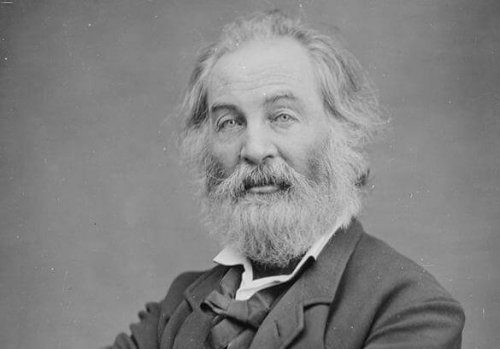Best Walt Whitman Quotes about Life

The quotes written by Walt Whitman are those of the true father of modern poetry. They also represent the voice of a man who, perhaps, exalted life like no other. A man who unleashed controversy and caused scandals.
This poet created works with the intention to reach all hearts. He moved away from complex canons and convoluted themes. This is why he’s also considered the father of the free verse, the one who simply seeks to let the heart speak, without leaving intellectuality aside while not allowing it to predominate.
The following quotes are also the verses of Walt Whitman’s poems. It isn’t easy to capture their full meaning outside the context of each poem. However, some of them are amazing on their own. Today, we’ve compiled some of these quotes so you can enjoy part of the great love for life that this poet professed through his verses.
Best quotes by Walt Whitman

Obedience
Walt Whitman’s phrases reflect his revolutionary way of thinking and his command of words. He was never given to following the protocols, laws, or moral codes of his time. He had a cheerful and vital rebellion that was highly contagious.
One of his quotes says: “Resist much, obey little“. This little phrase synthesized much of what this great poet was about. He was a true innovator and this is why he didn’t repeat and didn’t passively follow what others offered. Instead, he built from scratch.
The future
There’s much talk about the uncertainty of what the future holds. Time, however, is highly inaccurate. The now becomes the past in just a second. And tomorrow is already present in a second.
One of Walt Whitman’s quotes aims precisely at destroying those myths regarding time. He said: “The future is no more uncertain than the present“. He was right. What’s so sure about the present that makes it less uncertain than the future?
Simplicity

Simplicity is one of Whitman’s poetry’s greatest values and it doesn’t reduce its depth. This poet thought that words should be genuine and not hide behind complicated terms or complex structures.
One of his quotes says: “Simplicity is the art of art, the glory of expression and the sunlight of letters“. It’s an exaltation to the most authentic. In reality, it’s very difficult to convey deep ideas with simple words. The opposite is more common: finding simple ideas expressed in a complex way.
Walt Whitman on a leaf of grass
Leaves of Grass was Whitman’s climactic work and the title refers to what gave him his identity. Nature, pure and simple, is at the heart of his poems. He celebrated life in all its forms. To him, it was a miracle.
This statement makes it very clear: “The smallest leaf of grass teaches us that death doesn’t exist; that if it ever did, it was only to produce life”. It means that life as a concept is eternal. Every way of life perishes just for something new to be born.
Winning and losing

Whitman was always involved in political matters. He also served as a volunteer nurse in the American Civil War. He was deeply struck by the pain and misery he saw in the battlefields.
That experience was reflected in the poem Song of Myself. Also, many of his verses were dedicated to the subject. One of them says: “Battles are lost in the same spirit in which they are won“. This highlights the fight more than the triumph or defeat.
Everything is ephemeral
Whitman’s life wasn’t easy even though he was a man full of hope. He went through the rigor of economic narrowness during his childhood. He began working at age 11 and paid for the edition of his first version of Leaves of Grass out of his own pocket.
At the end of his life, he had a stroke that disabled him. He was in a lot of pain while he planned and ordered his own mausoleum in preparation for his death. He who loved life. One of his phrases says: “Gather ye rose-buds while ye may; Old Time is still a-flying; And this same flower that smiles today, Tomorrow will be dying”.
Walt Whitman and contradiction

One of Walt Whitman’s quotes says: “Do I contradict myself? Very well, then I contradict myself, I am large, I contain multitudes”. Thus, it’s clear that his world was multiversal. One in which the laws of logic operated but didn’t prevail.
Whitman lived in a world dominated by rationalism — or he wanted it to prevail at the very least. Thus, he shows that a human can go beyond ordinary logic. This verse also shows the side that so many rationalists deplore: the side of the eternal contradictions in which we all move.
Generally, Walt Whitman marked a before and after in poetry. But beyond that, he left us a wonderful legacy of poems that are like a breath of fresh air. Thus, he was brave because he dared to claim happiness and hope, in times that lacked both of those values.
The quotes written by Walt Whitman are those of the true father of modern poetry. They also represent the voice of a man who, perhaps, exalted life like no other. A man who unleashed controversy and caused scandals.
This poet created works with the intention to reach all hearts. He moved away from complex canons and convoluted themes. This is why he’s also considered the father of the free verse, the one who simply seeks to let the heart speak, without leaving intellectuality aside while not allowing it to predominate.
The following quotes are also the verses of Walt Whitman’s poems. It isn’t easy to capture their full meaning outside the context of each poem. However, some of them are amazing on their own. Today, we’ve compiled some of these quotes so you can enjoy part of the great love for life that this poet professed through his verses.
Best quotes by Walt Whitman

Obedience
Walt Whitman’s phrases reflect his revolutionary way of thinking and his command of words. He was never given to following the protocols, laws, or moral codes of his time. He had a cheerful and vital rebellion that was highly contagious.
One of his quotes says: “Resist much, obey little“. This little phrase synthesized much of what this great poet was about. He was a true innovator and this is why he didn’t repeat and didn’t passively follow what others offered. Instead, he built from scratch.
The future
There’s much talk about the uncertainty of what the future holds. Time, however, is highly inaccurate. The now becomes the past in just a second. And tomorrow is already present in a second.
One of Walt Whitman’s quotes aims precisely at destroying those myths regarding time. He said: “The future is no more uncertain than the present“. He was right. What’s so sure about the present that makes it less uncertain than the future?
Simplicity

Simplicity is one of Whitman’s poetry’s greatest values and it doesn’t reduce its depth. This poet thought that words should be genuine and not hide behind complicated terms or complex structures.
One of his quotes says: “Simplicity is the art of art, the glory of expression and the sunlight of letters“. It’s an exaltation to the most authentic. In reality, it’s very difficult to convey deep ideas with simple words. The opposite is more common: finding simple ideas expressed in a complex way.
Walt Whitman on a leaf of grass
Leaves of Grass was Whitman’s climactic work and the title refers to what gave him his identity. Nature, pure and simple, is at the heart of his poems. He celebrated life in all its forms. To him, it was a miracle.
This statement makes it very clear: “The smallest leaf of grass teaches us that death doesn’t exist; that if it ever did, it was only to produce life”. It means that life as a concept is eternal. Every way of life perishes just for something new to be born.
Winning and losing

Whitman was always involved in political matters. He also served as a volunteer nurse in the American Civil War. He was deeply struck by the pain and misery he saw in the battlefields.
That experience was reflected in the poem Song of Myself. Also, many of his verses were dedicated to the subject. One of them says: “Battles are lost in the same spirit in which they are won“. This highlights the fight more than the triumph or defeat.
Everything is ephemeral
Whitman’s life wasn’t easy even though he was a man full of hope. He went through the rigor of economic narrowness during his childhood. He began working at age 11 and paid for the edition of his first version of Leaves of Grass out of his own pocket.
At the end of his life, he had a stroke that disabled him. He was in a lot of pain while he planned and ordered his own mausoleum in preparation for his death. He who loved life. One of his phrases says: “Gather ye rose-buds while ye may; Old Time is still a-flying; And this same flower that smiles today, Tomorrow will be dying”.
Walt Whitman and contradiction

One of Walt Whitman’s quotes says: “Do I contradict myself? Very well, then I contradict myself, I am large, I contain multitudes”. Thus, it’s clear that his world was multiversal. One in which the laws of logic operated but didn’t prevail.
Whitman lived in a world dominated by rationalism — or he wanted it to prevail at the very least. Thus, he shows that a human can go beyond ordinary logic. This verse also shows the side that so many rationalists deplore: the side of the eternal contradictions in which we all move.
Generally, Walt Whitman marked a before and after in poetry. But beyond that, he left us a wonderful legacy of poems that are like a breath of fresh air. Thus, he was brave because he dared to claim happiness and hope, in times that lacked both of those values.
All cited sources were thoroughly reviewed by our team to ensure their quality, reliability, currency, and validity. The bibliography of this article was considered reliable and of academic or scientific accuracy.
Alegría, F. (1954). Walt Whitman en Hispanoamérica (Vol. 5). Ediciones studium.
This text is provided for informational purposes only and does not replace consultation with a professional. If in doubt, consult your specialist.







